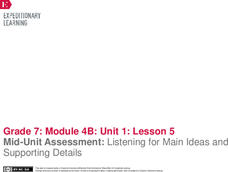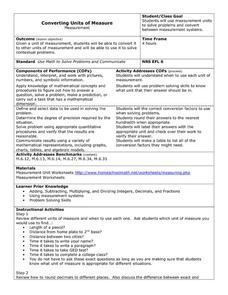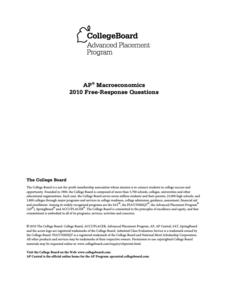Roald Dahl
Matilda - Throwing the Hammer
Full truth, or an exaggeration? How can you tell when a storyteller is exaggerating a story? Readers analyze a story told by Hortensia, and identify the exaggerative language she uses. Then, learners write their own narrative story using...
EngageNY
Mid-Unit Assessment: Listening for Main Ideas and Supporting Details
Pay attention! Scholars view the video"Why College Students Should Start Paying Attention to Water" multiple times to complete a note catcher. After discussing their thoughts with the class, learners watch "The Water Crisis Isn’t...
Florida Center for Reading Research
Comprehension: Monitoring for Understanding, Simple Summary
Can your class sum up a text in a few sentences? Help them build this skill by starting nice and slow. For this summarizing activity, the teacher marks the main ideas with sticky notes. Learners read and reread the text, pausing at the...
Facing History and Ourselves
Interracial Democracy
Radical Reconstruction, the 10-year period referred to after Congress passed the Reconstruction Act of 1867, saw the establishment of manhood suffrage, men voting without any racial qualifications. Southern states also rewrote their...
Roald Dahl
Matilda - The First Miracle
As the story unfolds, readers discover Matilda has a superpower. Take part in an activity that has learners talking about what superpower they would have, how they would use it, and how it could help others. Then, after reading the...
Ohio Literacy Resource Center
Converting Units of Measure
Follow six steps to implement this series of metric worksheets. Here, mathematicians exhibit their knowledge of problem solving, while converting units of measurement and label their answers with the applicable unit name.
NOAA
Invertebrates
Crabs and lobsters ... yum! The 18th installment of a 23-part NOAA Enrichment in Marine sciences and Oceanography (NEMO) program focuses on invertebrate marine life. After the lecture slideshow, learners conduct an activity to sample...
Florida Center for Reading Research
Phonological Awareness: Rhyme, Rhyme or No Rhyme
Rhyming is fun, builds phonemic awareness, and is a tried and true pre-reading skill. This activity helps learners identify words that rhyme. Young scholars listen to a song, locate a rhyming word they hear by clapping then draw a...
Maine Content Literacy Project
Introduction to The Lottery, by Shirley Jackson
"The Lottery" by Shirley Jackson is a great story to share with your class, and this lesson focuses on just that story! The eighth in a fourteen-lesson series on short stories, the plan has learners study some vocabulary, read the...
Fluence Learning
Divide Shapes
Let's partition rectangles into equal parts. Assess learners on their ability to divide shapes into equal parts, and their ability to explain their thinking.
PBS
Concept Map
Make the thought process visible with a handy concept map organizer. As learners develop their main ideas in research, writing, or creative development, they can add details and like ideas to the worksheet as needed.
NOAA
Communicate!: Create a Unique Message About Climate Change
Scholars use their communication skills to express their take on climate change in the ninth installment of the 10-part Discover Your Changing World series. They create ways to deliver their messages on a specific aspect of climate by...
Florida Center for Reading Research
Phonological Awareness: Rhyme, Rhyme Closed Sort
A rhyming activity challenges scholars to sort picture cards according to their rhyme. Four picture cards line up across the top of a pocket chart. Learners take turns choosing from a face-down stack of picture cards and sort them...
Federal Reserve Bank
The Little Red Hen Makes a Pizza
Make a study of producers and consumers with an updated version of the classic story The Little Red Hen (this one is called The Little Red Hen Makes a Pizza). After reading and discussing the story and terms, learners practice being...
NOAA
Ocean Acidification
If tap water is more acidic than ocean water, why are we so concerned about ocean acidification? The third installment of a 23-part NOAA Enrichment in Marine sciences and Oceanography (NEMO) program focuses on carbon dioxide levels in...
NOAA
Coastal Dynamics
Life's a beach! The 16th installment of a 23-part NOAA Enrichment in Marine sciences and Oceanography (NEMO) program first examines different types of coasts and how they form. An activity then has learners investigate the shoreline...
NOAA
Vertebrates II
Mammals of the ocean unite! Or not. The 20th installment of a 23-part NOAA Enrichment in Marine sciences and Oceanography (NEMO) program investigates how warm-blooded marine mammals survive in water. In the class activity, learners use...
College Board
AP® Computer Science A: Elevens Lab Student Guide
Looking for a project to use in an AP® Computer Science class? Engage learners with a simple solitaire game called Elevens. Through these activities, learners break down the task and write the code for a game. Sign in to your College...
College Board
2018 AP® English Language and Composition Free-Response Questions
Discussions of eminent domain sometimes trigger strong emotions. A set of free-response questions from the 2019 AP® English Language and Composition exam tackles the concept with a series of persuasive pieces. Learners analyze all six...
College Board
2017 AP® World History Free-Response Questions
Religion and politics have a complicated history. How were they intertwined with wealth in Europe and Asia in the Middle Ages? Learners explore the question using a prompt based on primary sources. Other activities allow individuals to...
College Board
2010 AP® Macroeconomics Free-Response Questions
Defense spending often has massive impacts on the economy. Learners consider its effect in a hypothetical case and structured questions from College Board. A second query asks them to consider the effects of international trade on...
College Board
2014 AP® Microeconomics Free-Response Questions
What effect do dynamics, monopolies, and the balance of skilled and unskilled labor have on a market place? How does supply affect the price of gasoline? Learners consider these questions and more using College Board materials as they...
Florida Center for Reading Research
Vocabulary: Morphemic Elements, Rooting for Meaning!
Scholars work with root and meaning cards to build vocabulary skills. Playing with a partner, learners read a root, locate its meaning, and cover it with a counter. The first player to cover their board wins.
Curated OER
Lesson: Emory Douglas: Art and Activism
Visual literacy can be experienced in many different ways. Learners discuss the times, graphic art, and cultural significance of activism in art as they explore artist and Black Panther, Emory Douglas. This is a discussion-based lesson...























